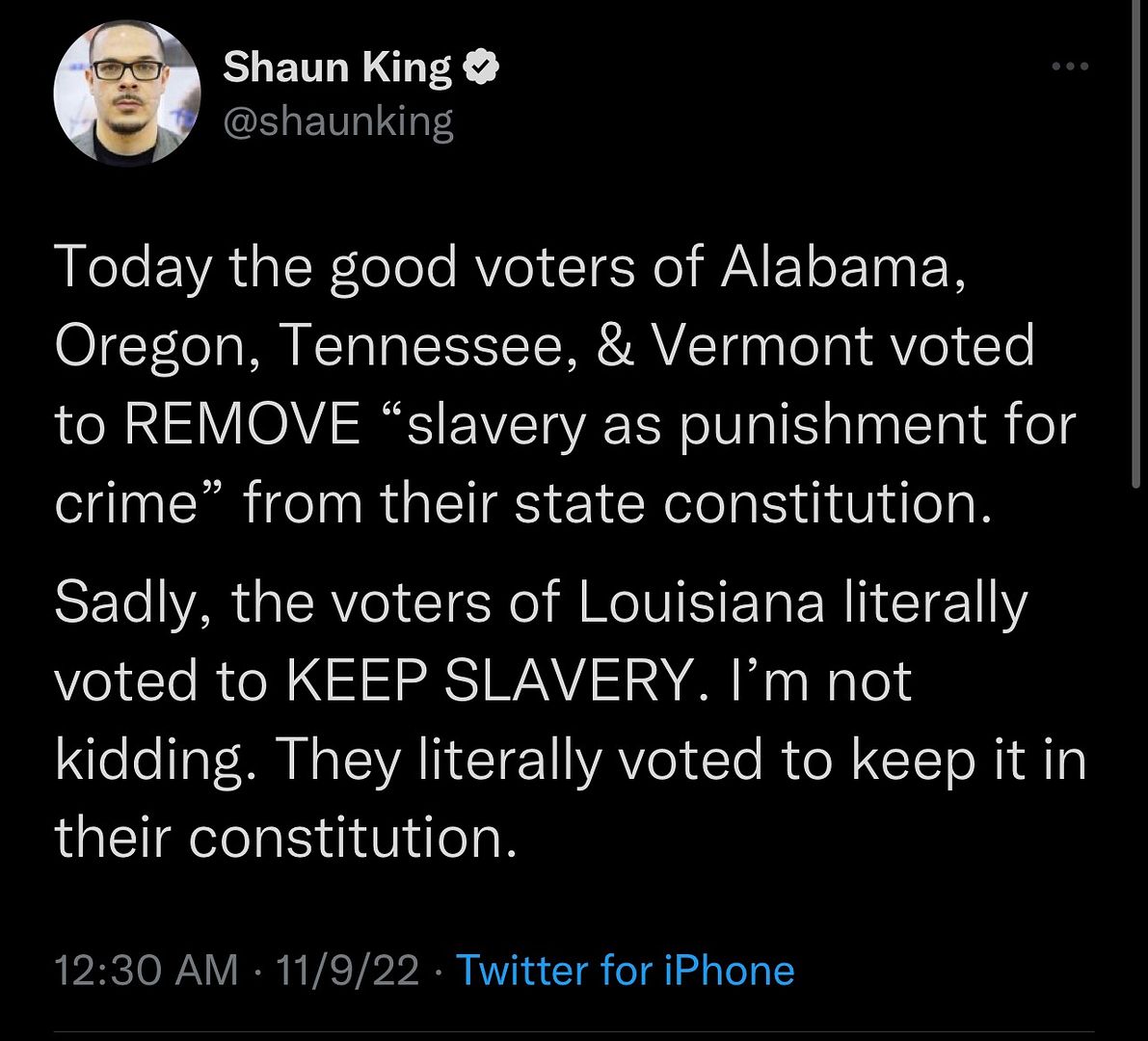Slavery was on the ballot in five states, and one former slave-holding state voted to keep it! Also, the legalization of marijuana was on the ballot in five different states and three of the states rejected it. Details inside…
The 2022 midterm elections went down yesterday, and things are chaotic today as ballots get counted across the nation. The Georgia Senate race will likely go to a runoff, however, Democrats were able to stall the “red wave” Republicans were banking on. So, all is not lost.
Choosing representatives for the House and the Senate is super important, but there were other important issues on the ballot. Two important issues that hit the ballot this year were slavery as a form of criminal punishment and the legalization of marijuana.
Voters in fours states - Alabama, Oregon, Tennessee and Vermont - reportedly approved to have slavery removed from their state constitution.
“Voters in Oregon and other states have come together across party lines to say that this stain must be removed from state constitutions,” Oregon Sen. Jeff Merkley, a Democrat, told The Associated Press. “Now, it is time for all Americans to come together and say that it must be struck from the U.S. Constitution. There should be no exceptions to a ban on slavery,” he said.
Voters in Louisiana, a former slave-holding state, rejected a ballot measure to remove language from their state constitution that permits slavery as a form of punishment for criminal convictions.

Nearly 20 states have constitutions that include language permitting slavery and involuntary servitude as criminal punishments.
The wording on the ballot confused voters, and they were unsure if they were voting for or against the exception. We def had a feeling something like that was the case.
ABC News reports:
The question on the ballot read, “Do you support an amendment to prohibit the use of involuntary servitude except as it applies to the otherwise lawful administration of criminal justice?” To vote yes, the ballot measure should have been a vote to remove the pro-slavery exception for criminal punishment, but its language could lead to multiple conclusions, according to one person who helped draft the bill.
Louisiana State Representative Edmond Jordan said the re-worded ballot measure led to confusion for many voters as to whether they were voting for or against the exception.
"I believe Louisiana residents would have abolished slavery had the confusion not existed, in the same way their neighbors in Alabama and Tennessee did, with some clarifications," Biance Tylek, the executive director of criminal justice advocacy organization Worth Rises, told ABC News.
Alabama voters also voted to remove several Jim Crow-era sections of their constitution, including one that allowed for slavery as criminal punishment, one that barred interracial marriage, and one that separated schools for white and Black students.
Another hot topic on a few ballots was the legalization of recreational marijuana.
.jpg)
Marijuana was on the ballot in several states this year, including Arkansas, Maryland, Missouri, and North and South Dakota.
Voters in Maryland and Missouri approved constitutional amendments legalizing recreational marijuana for people 21 and older. Both states' legislation will also change criminal law and expunge many previous marijuana possession convictions. Nonviolent offenses will be expunged in Missouri, for example, with the exception of selling to minors or driving under the influence. Arkansas (56% against), North (55% against), and South Dakota (54% against) rejected it.
Nineteen states and the District of Columbia allow recreational use of marijuana; while 13 states outlaw it entirely. The rest of the states—including Arkansas, South Dakota, and North Dakota—allow its use for medicinal purposes. It remains illegal under federal law.
After the Supreme Court overturned Roe. v. Wade, states are stepping up to protect women's rights.
According to CBS News, voters in at least three states - California, Michigan and Vermont - voted to protect abortion access.
The news outlet reports:
Abortion rights were directly on the ballot in California, Michigan, Vermont, Kentucky and Montana, through either proposed amendments to state constitutions or, in Montana, legislative referendum. In California, Michigan and Vermont, voters decided to enshrine abortion rights in their respective state constitutions. The ballot measures in Kentucky and Montana sought to limit abortion access, but CBS News has not projected a final outcome on those questions as of Wednesday.
Gun control was on the ballot for Oregon voters, and they reportedly passed Measure 114, which is one of the strictest gun control measures in the U.S.
Oregon Live reports:
The measure will require Oregonians to obtain a permit to buy a gun after completing a firearms safety course and would ban the sale or transfer of magazines that hold more than 10 rounds of ammunition.
It also will close the so-called Charleston loophole by requiring state police to complete full background checks on buyers with permits before any gun sale or transfer. Under federal law now, firearms dealers can sell guns without a completed background check if the check takes longer than three business days.
“We began this historic campaign to save lives with faith, and we remain hopeful as we wait for all of the votes to be counted,” said the Rev. Mark Knutson, one of the chief petitioners, speaking earlier in the night to supporters gathered at Portland’s Augustana Lutheran Church.
“We thank everyone that helped put Measure 114 on the ballot and supported us every step of the way, gathering signatures, knocking on doors, making phone calls, and turning those precious ballots in,” he said. “We are eternally grateful for your strength and dedication.”
And there's this...
Important note in Texas: Uvalde County voted overwhelmingly for Greg Abbott - 60 to 38 percent.
Even in the midst of suffering horrible tragedy, the community understands that gun control is NOT the answer.
— Sara Gonzales (@SaraGonzalesTX) November 9, 2022
In Uvalde County, where 19 kids and 2 teachers were murdered in their classroom earlier this year, voters turned out overwhelmingly in favor of reelecting Republican incumbent Gregg Abbott.
Abbott received 60.18 percent of total votes in contrast to Beto O'Rourke, who garnered only 38.32 percent of votes, according to unofficial results.
Wow. It's clear his lack of action on gun control following May's massacre did not stop people from voting to him.
Photos: Valery Sidelnykov/Brandon Crawford/Shutterstock
source: theybf



 Lorem ipsum dolor sit amet, consectetur adipiscing elit. Etiam id libero non erat fermentum varius eget at elit. Suspendisse vel mattis diam. Ut sed dui in lectus hendrerit interdum nec ac neque. Praesent a metus eget augue lacinia accumsan ullamcorper sit amet tellus.
Lorem ipsum dolor sit amet, consectetur adipiscing elit. Etiam id libero non erat fermentum varius eget at elit. Suspendisse vel mattis diam. Ut sed dui in lectus hendrerit interdum nec ac neque. Praesent a metus eget augue lacinia accumsan ullamcorper sit amet tellus.
0 comments:
Post a Comment